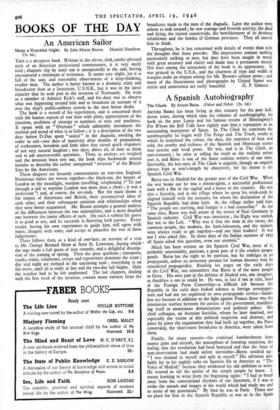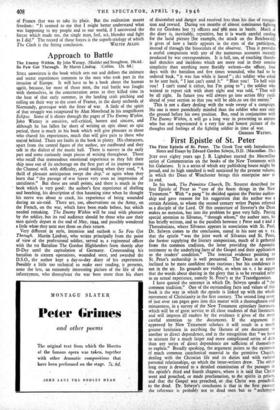A Spanish Autobiography
The Clash. By Arturo Barea. (Faber and Faber. 12s. 6d.)
ARTURO BAREA has been living in this country for the past half- dozen years, during which time his volumes of autobiography, his
book on the poet Lorca and his famous review of Hemingway's For Whom the Bell Tolls have rightly won him a reputation as an outstanding interpreter of Spain. In The Clash he continues the autobiography he began with The Forge and The Track, works in which he translated the colour, the dust, the extremes of heat and cold, the cruelty and richness of the Spanish and Moroccan scenes into precise and vivid prose. He was, and is in The Clash, an anti-romantic ; he aims at telling the truth as the realistic writer sees it, and Barea is one of the finest realistic writers of our time.
Inevitably, the key-note of The Clash is anguish, though an anguish always kept at arm's-length by objectivity, for his theme is the Spanish Civil War.
Barea was in Madrid for the greater part of the Civil War. When the war broke out he was a patent-agent, a successful professional man with a flat in the capital and a house in the country. He was also a Socialist, and in the village where he spent his week-ends he aligned himself with the peasants, for whom the declaration of the Spanish Republic had done little. As the village miller told him, " The people are starving, and hunger is a bad counsellor." At the same time, Barea was well aware of the power of Nazi Germany in Spanish industry. Civil War was imminent ; the Right was united, but not so the Left. " Why was it that the man in the street, the common people, the workers, the farm-labourers, and the miners, were always ready to get together—and not their leaders? It was not I who asked this. In those days of the Indian summer of 1935 all Spain asked this question, even our enemies."
Much has been written on the Spanish Civil War, most of it, probably unavoidably, partisan, a great part of it the crudest propa- ganda. Barea has the right to be partisan, but he indulges in no propaganda, unless an inveterate passion for human decency may be considered propagandist. Reading his pages on the early days of the Civil War, one remembers that Barea is of the same people as Goya. His own part in the defence of Madrid was, one imagines, as thankless a one as could be. He was, in fact if not in title, head of the Foreign Press Censorship—a difficult job because the Republic in the early days looked askance at foreign newspaper- men and had not yet organised its own propaganda service—thank- less too because in addition to the fight against Franco there was the internecine warfare between the parties of the government, manifest- ing itself in anonymous denunciations and political police. His chief colleague, an Austrian Socialist, whom he later married, was especially the victim of this political suspicion and distrust, and piece by piece the organisation they had built up together, the Press censorship, the short-wave broadcasts to America, were taken from them.
Finally, for many reasons—the continual bombardment from enemy guns and aircraft, the atmosphere of festering suspicion, the feeling that the revolution had been betrayed and that the farce of non-intervention had made defeat inevitable—Barea cracked up: " I was chained to myself and split in myself." His salvation pro- bably lay in his nightly talks on Spanish life to America as "The Voice of Madrid," because they awakened his old ambition to write. He wanted to tell the stories of the simple people he knew. It meant learning to write from the beginning again: " I had to break away' from the conventional rhythms of our literature, if I was to evoke the sounds and images of the world which had made me and so many of my generation." By then he was in Paris. There was no place for him in the Spanish Republic at war or in the Spain of Franco that was to take its place. But the realisation meant freedom: " It seemed to me that I might better understand what was happening to my people and to our world, if I uncovered the forces which made me, the single man, feel, act, blunder and fight as I did." The record of those forces is the superb triology of which
The Clash is the fitting conclusion. WALTER ALLEN.































 Previous page
Previous page